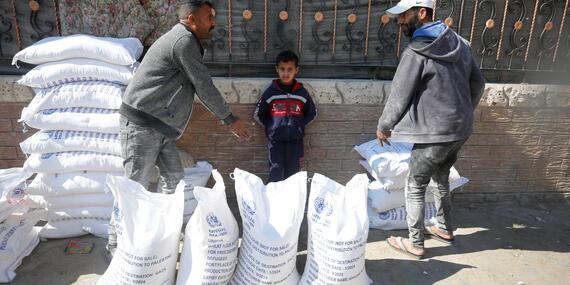Today's top news: Occupied Palestinian Territory, Lebanon, Ukraine, Mali

Occupied Palestinian Territory
Heavy fighting was reported yesterday in Khan Younis near the Al Aqsa, Nasser, Al Amal and Al Kheir hospitals.
There have also been reports of Palestinians trying to flee to the southern town of Rafah, which is already overcrowded, despite the lack of safe passage.
The head of the World Health Organization (WHO), Dr. Tedros Adhanom Ghebreyesus, said yesterday that WHO and the UN Relief and Works Agency for Palestine Refugees in the Near East (UNRWA) helped evacuate 45 patients from the Khan Younis Training Center, but was unable to evacuate all of the injured due to the fighting. One patient reportedly died en route. Dr. Tedros called for the protection of all civilians, humanitarians and health workers, while reiterating his appeal for an immediate ceasefire.
WHO also says that are currently 14 partially functional hospitals out of 36 in all of Gaza – seven in the north and seven in the south. ‘Partial functioning’ means that a hospital is accessible to people in need of health care and can admit some new patients and can undertake some level of surgery. Nasser Hospital in Khan Younis is ‘minimally functioning’ – meaning it is no longer able to receive patients or supplies.
Lebanon
The Humanitarian Coordinator there, Imran Riza, said in a statement today that the escalation in the south of the country is taking a growing toll on civilians.
Mr. Riza, who recently visited the southern region, met with people affected by the hostilities who have lost their homes and are now displaced. He also spoke with people who, despite the risks, are staying near the border.
“Many spoke of the last three months being a time of loss, fear, and extreme uncertainty about the future,” he said.
The last time such displacement happened in the region, during the 2006 war, people’s ability to buffer shocks was very different than today, Mr. Riza said. After years of economic crisis, people are left without savings and food.
According to OCHA, since the escalation of hostilities, more than 86,000 people have been displaced, with some 60,000 people remaining in border villages highly affected by exchanges of fire. At least 25 civilians have been killed since October 8th.
There has been significant damage inflicted upon health centers, essential civilian infrastructure, residential homes and agricultural lands.
We renew our call on all parties to take constant care to spare civilians and civilian infrastructure, and to facilitate access to civilians in need, in line with international humanitarian law.
Ukraine
The Humanitarian Coordinator in Ukraine, Denise Brown, condemned in a statement today a new attack on humanitarian workers in Chasiv Yar in the Donetsk Region in the east of the country.
This morning, a vehicle from a Ukrainian humanitarian organization called Mission Proliska was hit while its staff was just a few metres away distributing relief supplies. One aid worker was injured in the attack.
With civilians in Chasiv Yar having exhausted their scarce resources, Ms. Brown stressed the importance of the work carried out by volunteers, humanitarian organizations and local authorities.
“The work of humanitarian organizations must be protected,” she emphasized.
Since the beginning of the year, seven attacks have directly impacted humanitarian facilities and assets in the country.
Mali
The 2024 Humanitarian Response Plan was launched yesterday in the capital Bamako.
We and our humanitarian partners will need just over US$700 million to assist more than 4.1 million people across the country this year. These efforts will complement response activities implemented by national authorities.
In 2023, aid agencies received about 30 per cent of the $750 million they needed – or about $225 million. With these funds, they assisted more than 1.8 million people across the country.
While funding is urgently needed, aid agencies are also clear that humanitarian aid is not the solution to the challenges facing Mali. We continue to emphasize the need to maintain development assistance, as well as social cohesion programmes, to help communities keep moving forward and to avoid further increases in humanitarian needs in the future.
